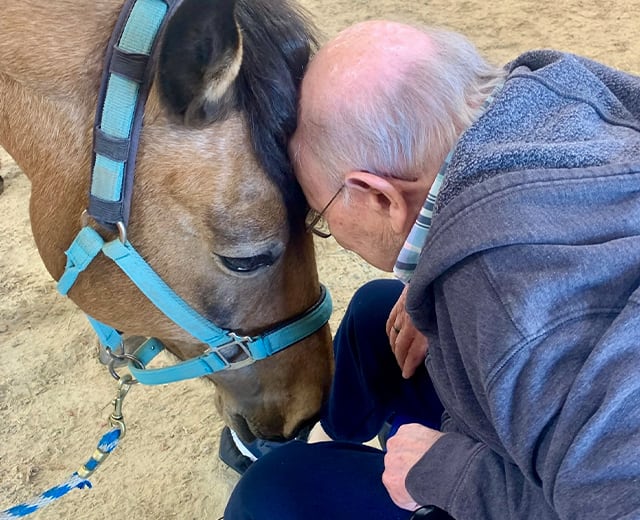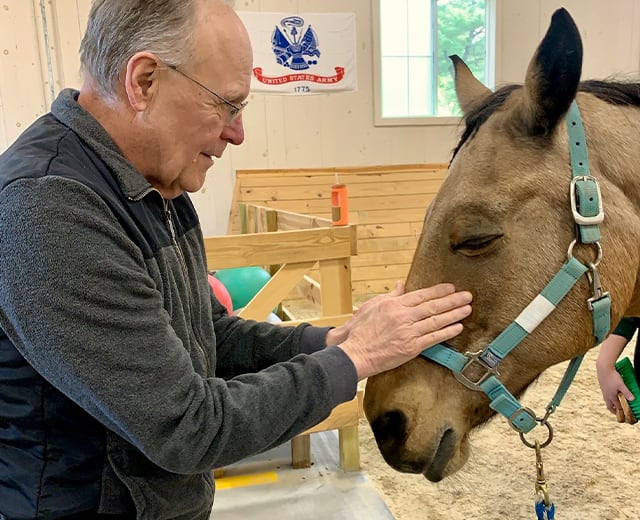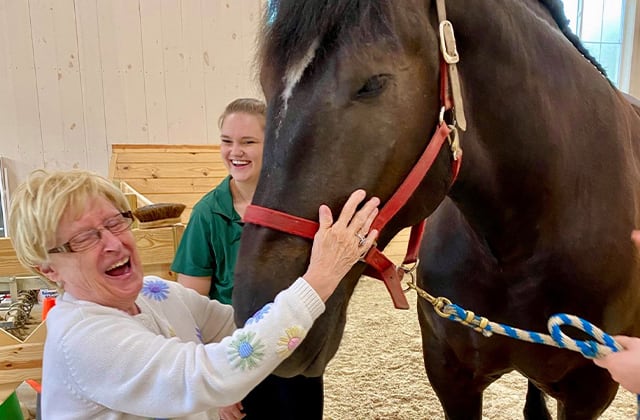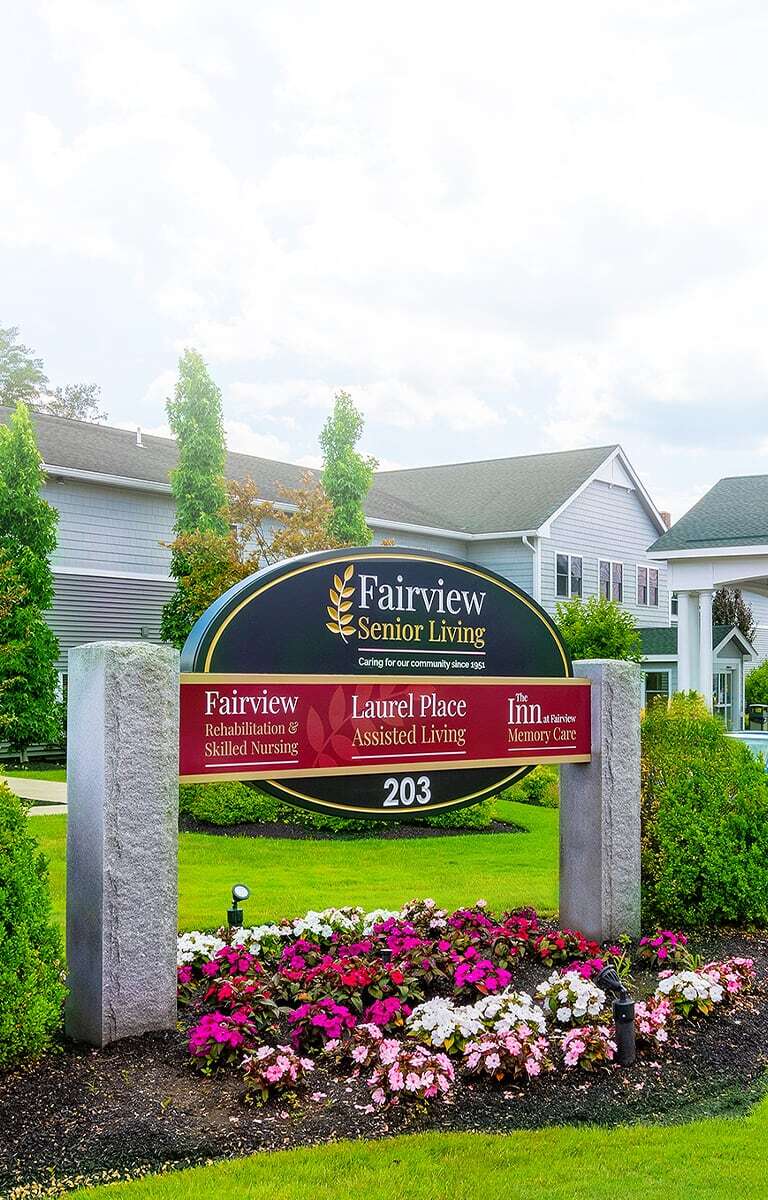For one hour every Friday, residents of The Inn at Fairview Memory Care at Fairview Senior Living board the bus to visit Strongwater Farm Therapeutic Equestrian Center in Tewksbury, MA so they can experience the healing power of horses. On this picturesque former dairy farm, spread over more than 400 acres of agricultural and conservation land approximately 20 miles north of Boston, a Professional Association of Therapeutic Horsemanship International (PATH) premier accredited therapeutic riding center is improving the quality of life and health for thousands of children and adults with physical, cognitive, and emotional needs by providing professionally supervised, equine-assisted activities and services.
For the residents of The Inn at Fairview, the program is an effective human-animal interaction therapy that provides benefits to individuals diagnosed with dementia. Never before have programs like the partnership between The Inn and Strongwater Farm been more relevant. The Alzheimer’s Association reports that an estimated 6.2 million Americans have a diagnosis of Alzheimer’s. It kills more people than breast and prostate cancer combined, and it’s the only leading cause of death that essentially has no effective treatment. “This means that right now, most of what we have in terms of treatment is palliative, and is focused on helping those affected by the disease maintain a good quality of life and cope as effectively as possible. That’s where our Touch Therapy program comes in,” explains Greg Batchelder, Executive Director at The Inn at Fairview.
Pet facilitated therapy (PFT) or the use of animals in the treatment of health issues dates back to 1792, when patients learned to care for themselves through caring for animals. In the 1960s, Child Psychologist Dr. Boris Levinson developed animal assisted therapy (AAT) by using his dog to help facilitate psychotherapy with children. Since then, research studies have shown improvement in psychological and physical symptoms when animals are used as part of the therapy experience, as well as improvement with social attention, self-efficacy, interpersonal interactions, mood disorders, and physiological changes in heart rate and cortisol levels.
But why horses? For centuries horses have relied on their abilities to adapt to change, sense their environment, and use the interdependence of the herd to thrive. Kassandra Kehoe, MA, Certified Rehabilitation Counselor Program Director, and PATH International Advanced Instructor & Mentor at Strongwater Farm explains, “As prey animals, horses are keenly sensitive to their environment in order to ensure their safety. Horses do not think in language, but rather feel the energy within and around them, which makes them highly intuitive and emotionally attuned to the slightest gesture, body posture or tension, tone of voice, or glance. They have a heightened sensitivity to human emotion, which is what they are most attuned to when around us, including those emotions that are often out of our conscious awareness. They respond to our behavior and feelings through their body language, which is clear and immediate; thus they can teach us how we impact those around us. Horses are considered living, breathing biofeedback machines.” The connections between people and horses have proven to be therapeutic in many populations due to the nonjudgmental, unconditional interactions horses offer to humans. “When horses are working with clients, they are very docile, and very relaxed, which in itself is very amazing since humans are typically predators of horses. However, the horses are able to sense that the human has a disability,” explains Kehoe.

The HeartMath Institute has studied how the human body reacts to a horse. Their research found that a horse can impact the heart rate of a human, similar to the physiology that occurs when petting a dog or cat. In addition to the horse impacting heart rate and helping to relieve common symptoms of anger and frustration experienced in patients with memory issues, the horse can impact memory in a way that can be profound to witness. “After experiences with the horses,” says Kassandra, “our patients commonly recall details associated with their experience with the horse. For example, stories from their childhood that are horse-related are often remembered, when they had been lost before. They also commonly regain short-term memory when recalling the horse’s name, even when they cannot recall their own family members’ names.”
Equine programs like Connected Horse, a nonprofit committed to the belief that horses and activities involving horses canprovide humans with valuable insight into the human healing process and purpose, partner with the University of California Davis and Stanford University to measure the effectiveness of their workshops. Together, they are studying the effects of participation in activities with horses on people with dementia, as well as their caregivers. The initial research produced positive data. After a year of promising results, they embarked on a comparative study at UC Davis School of Medicine, Alzheimer’s Disease Center, and School of Veterinary Medicine Center for Equine Health. Eighty-eight people participated in the research study and the preliminary findings were presented at the International Alzheimer’s Association Conference. The results were promising, and indicators showed an overall positive trend in measures of support, burden, stress, and sleep, with a decrease in undesired behaviors and positive increases in communication between the patient and caregiver.
In addition to the changes in mood and in memory Kehoe has witnessed, she has seen the simple joy and smiles experienced by participants just from having an outing to a destination in a non-traditional setting. Individuals with memory-related issues can experience stress, anger, and sleep disorders. Often, they sit all day and don’t get enough physical activity. “Working with the horse allows them to stand up, to walk, and to use their arms when brushing the horse,” says Kehoe.

When patients arrive at Strongwater Farm each week, they assemble in a horseshoe-shaped group and each individual gets an opportunity to approach the horse, one by one. As their peers watch, each person has time to experience grooming, patting, or massaging the horse. The handler and counselor talk with the group about what the horse is feeling during that interaction and how the horse is enjoying it, which provides bio-feedback and encourages self-awareness in the patient. The counselor may say, “The horse is really enjoying this. See how he is closing his eyes, relaxing and lowering his head for you?” Both 1:1 and group interactions take place during The Inn’s weekly sessions at Strongwater Farm.
The Inn’s Batchelder describes the joy and happiness the residents express while engaging with the horses as “amazing.” “It’s a sight to be seen. They become more expressive, they communicate more and are noticeably more engaged with other residents and staff. I’ve seen a marked reduction in anxiety and anger as well as improved mood.” This change occurs while participants are actively engaged in the program, but also when they return home to The Inn. They are excited and smiling, talking about what a wonderful time they’ve had and sharing details of the day.
References:
Today’s Geriatric Medicine
Equine Therapy for Dementia
Healing with Horses: Alzheimer’s Dementia Patients Respond to Equine Therapy
Heart-to-Heart Communication With Horses
With Ann Baldwin, Ph.D. and Rollin McCraty, Ph.D.




